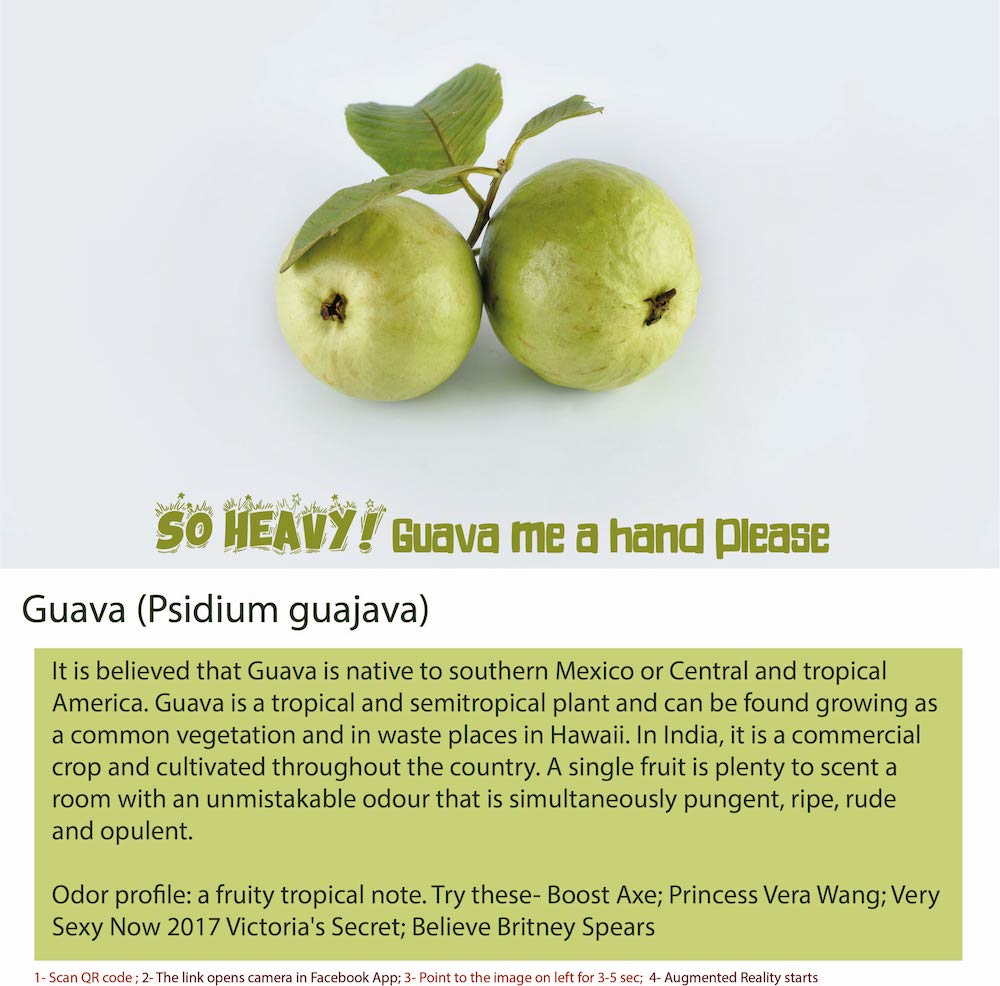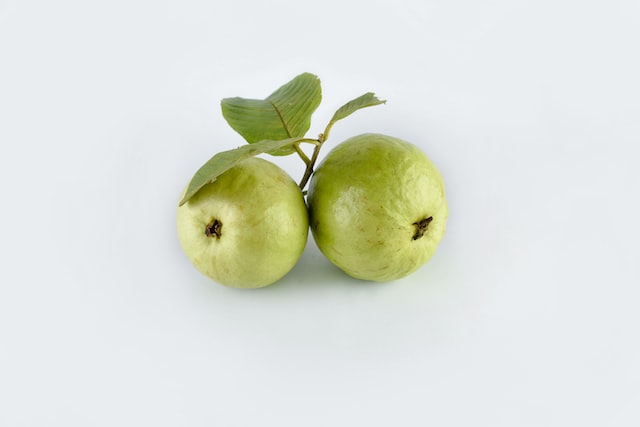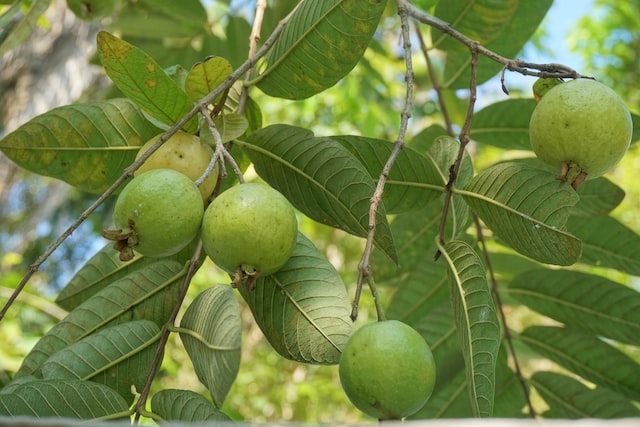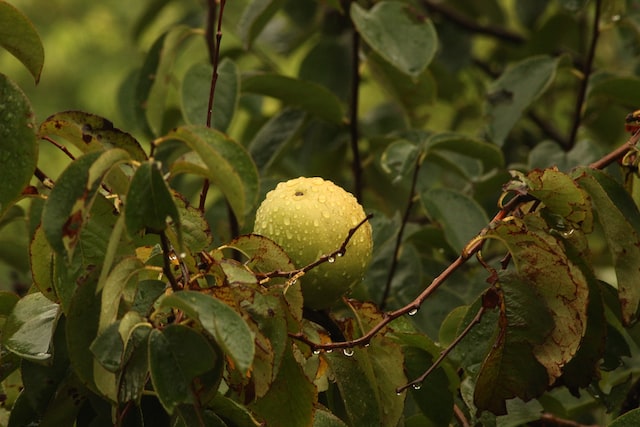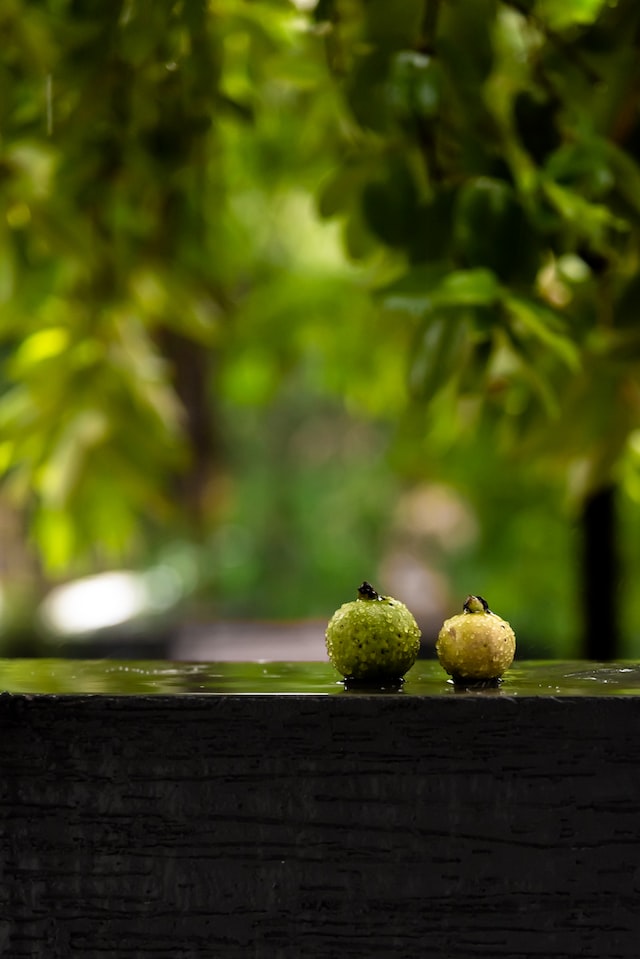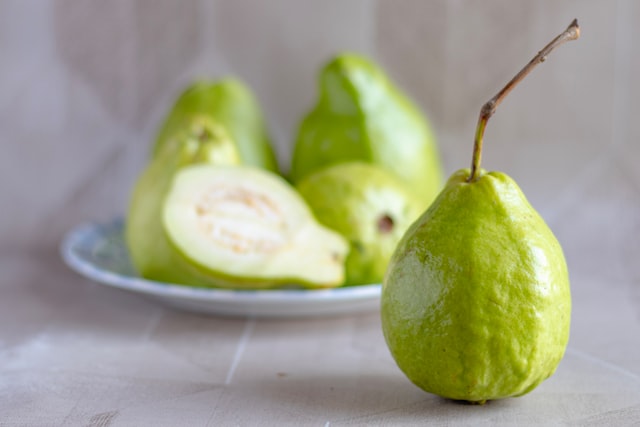Explore the Enchanting Guava Bright Perfumery Scent Note
Guava: The Tropical Delight of Fragrance and Flavor - From Perfumes to Fun Crazy Facts
Guava, scientifically known as Psidium guajava, is a tropical fruit that delights the senses with its sweet fragrance and delicious taste. This luscious gem holds a prominent place in various domains, including perfumes, fragrance, therapeutic oils, food, medicinal systems, history, and even fun crazy facts. In this article, we embark on a journey to explore the captivating allure of guava, uncovering its diverse uses and intriguing characteristics that have enchanted people for generations.
1. Guava in Perfumes and Fragrance
The sweet and tropical aroma of guava has inspired perfumers to incorporate its essence into fragrances. While guava extract itself is not commonly used in perfumery, certain fragrances aim to capture the essence of its fruity and tropical scent, evoking a sense of exoticism and joy.
2. Guava in Therapeutic Oils
Guava is not commonly used as a primary source of therapeutic oils in aromatherapy. However, guava leaf extract is believed to have potential health benefits, including antimicrobial and anti-inflammatory properties.
3. Guava in Culinary Delights
Guava is a beloved tropical fruit used in a variety of culinary creations. It can be enjoyed fresh, added to fruit salads, used in smoothies and juices, or incorporated into desserts, jams, and preserves. Guava's unique flavor adds a delightful tropical twist to a wide array of dishes.
4. Guava in Medicinal Systems
Guava has a long history of use in traditional medicine for its potential health benefits. It is rich in vitamins, minerals, and antioxidants, making it a valuable fruit for supporting overall well-being and boosting the immune system.
5. Historical Significance of Guava
Guava has been cultivated and enjoyed for centuries in tropical regions around the world. Its rich history includes being highly regarded in ancient civilizations for its nutritional value and medicinal properties.
6. Fun and Crazy Facts about Guava
a. Guava and Vitamin C: Guava is one of the richest sources of vitamin C, containing four times more of the nutrient than oranges.
b. Guava Leaf Tea: Guava leaves are used to make a popular herbal tea with potential health benefits, including aiding in digestion and promoting healthy skin.
c. Guava in Traditional Ceremonies: In certain cultures, guava leaves and fruits have been used in traditional ceremonies and rituals to symbolize fertility and prosperity.
d. Diverse Varieties: Guava comes in various cultivars, each with its unique flavor profile and characteristics, ranging from sweet to tangy.
e. Natural Mouth Freshener: Chewing on guava leaves or consuming guava fruit is believed to act as a natural mouth freshener due to its astringent properties.
Guava, with its tropical fragrance and delectable flavor, stands as a delightful tropical delight cherished in culinary creations and beyond. From fragrances that capture its sweet essence to intriguing fun facts, guava continues to captivate and bring a taste of the tropics to our lives. Whether savored fresh for its juicy sweetness or appreciated for its potential health benefits, guava represents the exotic and nutritious fruits that brighten our palates and nourish our bodies. As we celebrate guava's contributions to various aspects of human life, it stands as a testament to the enduring appeal of tropical treasures and their ability to enliven our senses and culinary experiences.
Guava, scientifically known as Psidium guajava, is a tropical fruit that delights the senses with its sweet fragrance and delicious taste. This luscious gem holds a prominent place in various domains, including perfumes, fragrance, therapeutic oils, food, medicinal systems, history, and even fun crazy facts. In this article, we embark on a journey to explore the captivating allure of guava, uncovering its diverse uses and intriguing characteristics that have enchanted people for generations.
1. Guava in Perfumes and Fragrance
The sweet and tropical aroma of guava has inspired perfumers to incorporate its essence into fragrances. While guava extract itself is not commonly used in perfumery, certain fragrances aim to capture the essence of its fruity and tropical scent, evoking a sense of exoticism and joy.
2. Guava in Therapeutic Oils
Guava is not commonly used as a primary source of therapeutic oils in aromatherapy. However, guava leaf extract is believed to have potential health benefits, including antimicrobial and anti-inflammatory properties.
3. Guava in Culinary Delights
Guava is a beloved tropical fruit used in a variety of culinary creations. It can be enjoyed fresh, added to fruit salads, used in smoothies and juices, or incorporated into desserts, jams, and preserves. Guava's unique flavor adds a delightful tropical twist to a wide array of dishes.
4. Guava in Medicinal Systems
Guava has a long history of use in traditional medicine for its potential health benefits. It is rich in vitamins, minerals, and antioxidants, making it a valuable fruit for supporting overall well-being and boosting the immune system.
5. Historical Significance of Guava
Guava has been cultivated and enjoyed for centuries in tropical regions around the world. Its rich history includes being highly regarded in ancient civilizations for its nutritional value and medicinal properties.
6. Fun and Crazy Facts about Guava
a. Guava and Vitamin C: Guava is one of the richest sources of vitamin C, containing four times more of the nutrient than oranges.
b. Guava Leaf Tea: Guava leaves are used to make a popular herbal tea with potential health benefits, including aiding in digestion and promoting healthy skin.
c. Guava in Traditional Ceremonies: In certain cultures, guava leaves and fruits have been used in traditional ceremonies and rituals to symbolize fertility and prosperity.
d. Diverse Varieties: Guava comes in various cultivars, each with its unique flavor profile and characteristics, ranging from sweet to tangy.
e. Natural Mouth Freshener: Chewing on guava leaves or consuming guava fruit is believed to act as a natural mouth freshener due to its astringent properties.
Guava, with its tropical fragrance and delectable flavor, stands as a delightful tropical delight cherished in culinary creations and beyond. From fragrances that capture its sweet essence to intriguing fun facts, guava continues to captivate and bring a taste of the tropics to our lives. Whether savored fresh for its juicy sweetness or appreciated for its potential health benefits, guava represents the exotic and nutritious fruits that brighten our palates and nourish our bodies. As we celebrate guava's contributions to various aspects of human life, it stands as a testament to the enduring appeal of tropical treasures and their ability to enliven our senses and culinary experiences.
To experience augmented reality, please open the Facebook-app using QR code and point to the image below
Unveiling the Essence of Guava Fragrance
Guava, a delightful tropical fruit originating from Central America and Mexico, belongs to the myrtle family and shares kinship with other fruits like litchi and longan. Its botanical name is Psidium guajava. Known for its distinctive sweet and slightly tart taste, guava offers a burst of flavor that captivates the palate.
One of the standout qualities of guava is its impressive nutritional profile. It is notably high in vitamin C, a vital antioxidant that supports the immune system, aids in collagen formation, and contributes to healthy skin. Additionally, guava is a rich source of dietary fiber, which is essential for digestive health and helps to maintain regular bowel movements.
The guava fruit itself is a visual delight, typically rounded or pear-shaped with green to yellowish skin, depending on the variety. The flesh inside can range from white to pink or even deep red, depending on the cultivar. The presence of numerous small, edible seeds adds a pleasant crunch and textural dimension to the eating experience.
Enjoying guava is a versatile endeavor. One can savor it fresh by slicing it open and relishing the succulent flesh and aromatic fragrance. Alternatively, guava can be transformed into a myriad of culinary delights, such as jams, jellies, marmalades, and preserves. Its natural pectin content lends itself well to these preparations, allowing for the creation of delightful spreads that capture the fruit's essence.
Beyond its culinary uses, guava also finds a place in traditional medicine practices. The leaves of the guava tree have been employed in various cultures as a remedy for a range of ailments. They are often brewed into teas or concoctions that are believed to possess medicinal properties. The leaves have been suggested to aid in managing issues like diarrhea, inflammation, and even diabetes. While scientific research on the efficacy of these traditional uses is ongoing, the cultural significance of guava's role in holistic health remains noteworthy.
In conclusion, guava stands as a testament to the vibrant flavors and rich nutritional diversity that tropical fruits bring to the table. Its tangy-sweet taste, vitamin-rich composition, and adaptability in culinary and traditional medicinal contexts make it a cherished and sought-after fruit in regions where it thrives. Whether savored fresh, transformed into preserves, or utilized for its potential health benefits, guava remains an emblem of the tropical bounty that nature offers.
One of the standout qualities of guava is its impressive nutritional profile. It is notably high in vitamin C, a vital antioxidant that supports the immune system, aids in collagen formation, and contributes to healthy skin. Additionally, guava is a rich source of dietary fiber, which is essential for digestive health and helps to maintain regular bowel movements.
The guava fruit itself is a visual delight, typically rounded or pear-shaped with green to yellowish skin, depending on the variety. The flesh inside can range from white to pink or even deep red, depending on the cultivar. The presence of numerous small, edible seeds adds a pleasant crunch and textural dimension to the eating experience.
Enjoying guava is a versatile endeavor. One can savor it fresh by slicing it open and relishing the succulent flesh and aromatic fragrance. Alternatively, guava can be transformed into a myriad of culinary delights, such as jams, jellies, marmalades, and preserves. Its natural pectin content lends itself well to these preparations, allowing for the creation of delightful spreads that capture the fruit's essence.
Beyond its culinary uses, guava also finds a place in traditional medicine practices. The leaves of the guava tree have been employed in various cultures as a remedy for a range of ailments. They are often brewed into teas or concoctions that are believed to possess medicinal properties. The leaves have been suggested to aid in managing issues like diarrhea, inflammation, and even diabetes. While scientific research on the efficacy of these traditional uses is ongoing, the cultural significance of guava's role in holistic health remains noteworthy.
In conclusion, guava stands as a testament to the vibrant flavors and rich nutritional diversity that tropical fruits bring to the table. Its tangy-sweet taste, vitamin-rich composition, and adaptability in culinary and traditional medicinal contexts make it a cherished and sought-after fruit in regions where it thrives. Whether savored fresh, transformed into preserves, or utilized for its potential health benefits, guava remains an emblem of the tropical bounty that nature offers.
Aromatic Journey through Bright Perfumery
Guava, a captivating fruit steeped in history and cultural significance, boasts a lineage that traces back to the lush landscapes of Central America and Mexico. It is a testament to the enduring relationship between humanity and the bounties of nature, having been cultivated and cherished for countless generations.
The origins of guava are rooted in the vibrant tapestry of ancient civilizations. Among the first to recognize its culinary and nutritional value were the Aztecs and Mayans, who found solace in its juicy flesh and incorporated it into their diets as a staple food. The fruit's inherent abundance of flavors and nutrients made it an essential component of their sustenance, while also contributing to their cultural practices and rituals.
As history unfurled, guava played a pivotal role in the lives of early settlers, particularly those who ventured into the Caribbean and South America. These regions, graced with the perfect climate for guava cultivation, nurtured the growth of this tropical gem. The fruit's adaptability to the environment and its generous yield contributed to its popularity among communities seeking both nourishment and a connection to the land.
The intricate interplay of exploration and exchange brought guava to distant shores. The 16th century heralded the introduction of guava to Europe through the efforts of intrepid Spanish and Portuguese explorers. The fruit's exotic allure captured the European palate, and its swift spread across tropical colonies brought a touch of familiarity to far-flung lands. This introduction marked the inception of guava's global journey, enriching the culinary and cultural tapestries of countless societies.
A chapter of guava's story unfolds in the Philippine archipelago, where it took root after being introduced by Spanish colonizers during the 19th century. Here, the fruit not only flourished but also found a cherished place in the hearts of the locals. Its presence became so ingrained that guava was eventually declared the national fruit of the Philippines, serving as a symbol of its connection to history and the land.
With the passage of time, guava's travels expanded further. It journeyed to diverse corners of the world, embracing the soil of Africa, Asia, and Australia. The fruit's adaptability allowed it to take root in these new landscapes, enriching local diets and traditions. As it mingled with cultures and cuisines, it assumed new meanings and roles, symbolizing not only nourishment but also the crossroads of cultural exchange.
In the modern era, guava's cultivation and production have reached remarkable heights. Nations like India, China, Mexico, and Brazil have risen to prominence as some of the world's largest guava producers, a testament to the fruit's enduring appeal and economic significance.
Guava's legacy is a tale of resilience, exploration, and communion with nature. From its humble beginnings among ancient civilizations to its present-day status as a global culinary treasure, guava stands as a reminder of the profound connections we share with the natural world and the flavors that enrich our lives.
The origins of guava are rooted in the vibrant tapestry of ancient civilizations. Among the first to recognize its culinary and nutritional value were the Aztecs and Mayans, who found solace in its juicy flesh and incorporated it into their diets as a staple food. The fruit's inherent abundance of flavors and nutrients made it an essential component of their sustenance, while also contributing to their cultural practices and rituals.
As history unfurled, guava played a pivotal role in the lives of early settlers, particularly those who ventured into the Caribbean and South America. These regions, graced with the perfect climate for guava cultivation, nurtured the growth of this tropical gem. The fruit's adaptability to the environment and its generous yield contributed to its popularity among communities seeking both nourishment and a connection to the land.
The intricate interplay of exploration and exchange brought guava to distant shores. The 16th century heralded the introduction of guava to Europe through the efforts of intrepid Spanish and Portuguese explorers. The fruit's exotic allure captured the European palate, and its swift spread across tropical colonies brought a touch of familiarity to far-flung lands. This introduction marked the inception of guava's global journey, enriching the culinary and cultural tapestries of countless societies.
A chapter of guava's story unfolds in the Philippine archipelago, where it took root after being introduced by Spanish colonizers during the 19th century. Here, the fruit not only flourished but also found a cherished place in the hearts of the locals. Its presence became so ingrained that guava was eventually declared the national fruit of the Philippines, serving as a symbol of its connection to history and the land.
With the passage of time, guava's travels expanded further. It journeyed to diverse corners of the world, embracing the soil of Africa, Asia, and Australia. The fruit's adaptability allowed it to take root in these new landscapes, enriching local diets and traditions. As it mingled with cultures and cuisines, it assumed new meanings and roles, symbolizing not only nourishment but also the crossroads of cultural exchange.
In the modern era, guava's cultivation and production have reached remarkable heights. Nations like India, China, Mexico, and Brazil have risen to prominence as some of the world's largest guava producers, a testament to the fruit's enduring appeal and economic significance.
Guava's legacy is a tale of resilience, exploration, and communion with nature. From its humble beginnings among ancient civilizations to its present-day status as a global culinary treasure, guava stands as a reminder of the profound connections we share with the natural world and the flavors that enrich our lives.
Discover the Notes of Guava Perfume
Guava has a distinct, sweet and slightly tart aroma that is often described as a mix of apple, strawberry, and pine. The aroma is most pronounced in fully ripe fruits and is due to the presence of volatile organic compounds such as esters, terpenes, and aldehydes.
Guava leaves also have a distinct aroma, which is often described as fresh and herbaceous. The leaves contain essential oils that include compounds such as myrcene, limonene, and linalool. These compounds give guava leaves their characteristic scent and are also used in traditional medicine to treat a variety of ailments.
The aroma of guava fruit and leaves is also used in the food and fragrance industries, where it is used to flavor and scent a wide variety of products such as candies, jams, jellies, teas, perfumes, and soaps.
Guava leaves also have a distinct aroma, which is often described as fresh and herbaceous. The leaves contain essential oils that include compounds such as myrcene, limonene, and linalool. These compounds give guava leaves their characteristic scent and are also used in traditional medicine to treat a variety of ailments.
The aroma of guava fruit and leaves is also used in the food and fragrance industries, where it is used to flavor and scent a wide variety of products such as candies, jams, jellies, teas, perfumes, and soaps.
The Captivating Guava Aroma
Guava has been used in traditional medicine for centuries, and it is believed to have a variety of therapeutic properties. Some of the most commonly claimed health benefits of guava include:
- High in Vitamin C: Guava is an excellent source of vitamin C, which is an important antioxidant that helps to protect cells from damage caused by free radicals.
- Rich in dietary fiber: Guava is rich in dietary fiber, which can help to promote regular bowel movements and prevent constipation.
- Good for the heart: The high levels of potassium and vitamin C in guava may help to lower blood pressure and reduce the risk of heart disease.
- Anti-cancer properties: Some studies have suggested that compounds found in guava leaves may have anti-cancer properties and may help to inhibit the growth of cancer cells.
- Help to improve digestion: Guava contain high amount of fiber which can help to improve digestion and prevent constipation.
Crafting the Perfect Scent Experience
Guava fun facts
- Guava is a good source of vitamin C, which is more than four times the amount found in an orange.
- Guava fruit is a good source of dietary fiber and protein, making it a great option for those who are trying to lose weight.
- Guava leaves are used in traditional medicine to treat a variety of ailments, including diarrhea, stomach problems, and high blood pressure.
- Guava is a tropical fruit, but it can be grown in subtropical and warm temperate climates as well.
- Guava is a versatile fruit that can be eaten fresh, used to make jams, jellies, and preserves, or even used as a flavoring for drinks and desserts.
- Guava fruit is not only delicious but also healthy, it contains high amount of Vitamin A and Vitamin C which is good for our eyes and skin.
- Guava tree is known for its hardiness, it can grow well in poor soil, drought condition and can tolerate salt spray.
- Guava fruit is a good source of antioxidants and phytochemicals which can help to reduce the risk of chronic diseases such as cancer and heart disease.
Guava Scent Note: A Floral Delight
Guava is a popular ingredient in perfumes and fragrances due to its distinct sweet and slightly tart aroma. Here are a few examples of famous perfumes that feature guava as a key note:
- Jo Malone Guava: This fragrance is a part of Jo Malone's Cologne Intense collection, it features guava as the main note and is blended with other tropical fruits and floral notes to create a fresh, juicy, and uplifting scent.
- Guava by Demeter Fragrance Library: This fragrance is a simple and straightforward guava scent, it's made to smell like a freshly cut guava fruit.
- Demeter Guava Colada: This fragrance is a blend of guava and pineapple, it's made to smell like a tropical cocktail with a fruity and sweet scent.
- L'Occitane Guava Sorbet: This fragrance is a part of L'Occitane's Les Plaisirs Nature collection, it features guava as the main note and is blended with other tropical fruit notes to create a sweet and refreshing scent.
- Tom Ford Costa Azzurra: This fragrance features a mix of guava, mandarin, and rosemary, it's a fresh, fruity and slightly spicy scent.
Join Scentopia, Sentosa's latest tourist attraction wonderful orchid scent crafting, fragrance tour, bridal shower or corporate team building which includes perfume making onsite and offsite, beach activities and more. We also serve primary school learning journey, secondary students and pupil on industrial excursions. Know more about our orchids perfume bar or therapeutic orchid scents and other wellness aromas. Conatct Perfume workshop or book a scent crafting session here.

